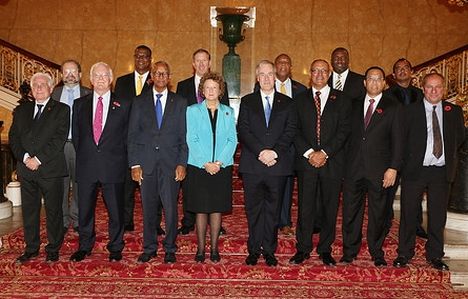
LONDON, England — Leaders from the British Overseas Territories are currently in London, where they held a a successful meeting of the United Kingdom Overseas Territories Association (UKOTA) Political Council in preparation for meetings with the UK government at the Joint Ministerial Council (JMC).
At the Political Council meeting, the overseas territories leaders discussed a number of issues, including economic development, international trade, health, pensions and Brexit .
In a statement, president of the Council, British Virgin Islands premier, Dr Orlando Smith, said, “I am pleased with the outcome of our deliberations which has positioned us to better engage the UK government at our ministerial meetings this week.”
Among other things, the leaders agreed that high level engagement between the UK government and the overseas territories was needed on Brexit negotiations through a sustained dialogue.
“We are unified in our view of the importance of a UK government and overseas territories special ministerial meeting on Brexit negotiations in early 2017 before Article 50 of the Lisbon Treaty is triggered in March to formally begin negotiations on Britain’s withdrawal from the European Union. We will make this case at the JMC,” Smith added.
Reflecting on his role as president of the UKOTA Political Council, Smith said, “I am pleased that I have the commitment of my fellow OT leaders for the overseas territories to work more closely together going forward, which strengthens our voice internationally and will benefit us all.”
When the JMC meeting opened on Tuesday, the question of pensions and healthcare for retired British citizens living in the territories dominated the talks. Peter Hayes, the Foreign and Commonwealth Office (FCO) director of the overseas territories, opened the discussion about retirees who paid into the UK pensions system and are living in the territories but don’t receive increases in their pensions allowing for inflation.
Pensioners living in Bermuda or Gibraltar do and other British Overseas Territories leaders are asking for equitable treatment to those living in the UK or the crown dependencies.
“It comes down to the question of what constitutes a British citizen, which we all are,” Cayman Islands Premier Alden McLaughlin said.
The matter was described by the McLaughlin’s press secretary in a release from London as a “major issue” for some territories because British pensioners often find themselves seeking welfare assistance from the BOT government where they live.
The UK takes the position that it cannot afford to pay overseas pensioners the increases because it could make the British government liable to pay similar increases to all citizens living in Commonwealth countries.
During the discussions, however, Hayes suggested that UK constitutional and pension lawyers meet to try to find a solution to satisfy the BOTs. The leaders of the BOTs also agreed to formally write and put their positions forward again for consideration.
Roger Edwards, of the Falkland Islands, led this discussion for the BOTs, with various BOT ministers joining in. Richard Harrington, undersecretary of state for pensions, led the discussion for the UK government.
Discussions on health were led by Turks and Caicos Islands Premier Dr Rufus Ewing and Lord Prior of Brampton, who is the undersecretary of state for health. Issues discussed included the number of territory patients that can receive treatment in the UK under the NHS, telemedicine, health tourism and other matters to do with health.
Photo: Joint Ministerial Council meeting in London


